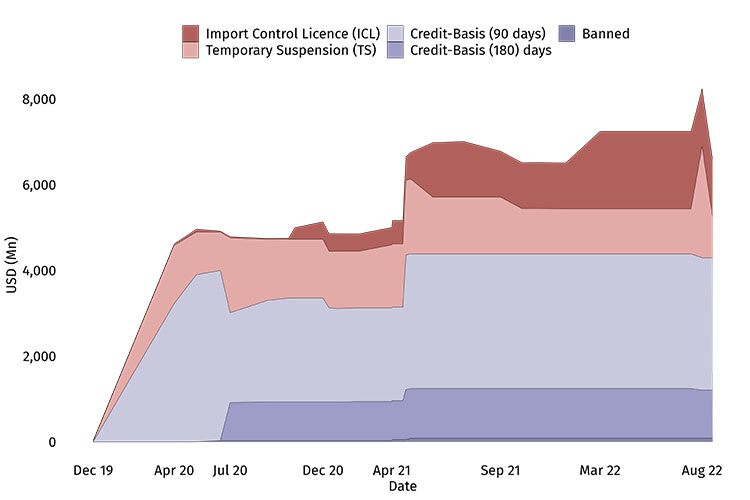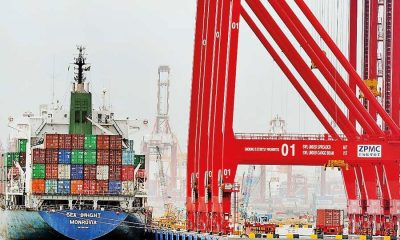Business
Has Sri Lanka’s crisis-driven import controls incentivised import substitution?

By Dr Asanka Wijesinghe and Nilupulee Rathnayake
In response to the economic crisis, Sri Lanka implemented import controls that expanded significantly by the end of 2022, accounting for approximately 30% of the country’s total import value (Figure 1). The controls affected various categories, including consumption goods (46%), intermediate goods (31%), and capital goods (24%). As Sri Lanka gradually eases these controls, questions arise about the necessity of this strategy and its impact on economic growth.
Was implementing import controls a necessary strategy or the easiest option available to the government?
Were import controls applied optimally to limit damaging effects on growth?
Did they distort incentives, thereby promoting domestic production of substitutable products?
 To shed light on these concerns, a comprehensive analysis was conducted using a unique dataset comprising eight waves of import controls. These controls encompassed quantitative and price restrictions at a disaggregated product level using a range of Gazette notifications issued between April 2020 to September 2022.
To shed light on these concerns, a comprehensive analysis was conducted using a unique dataset comprising eight waves of import controls. These controls encompassed quantitative and price restrictions at a disaggregated product level using a range of Gazette notifications issued between April 2020 to September 2022.
Were Import Controls Necessary? Unravelling the Policy Objectives
The objective behind the successive rounds of controls remains unclear, with the government declaring different goals at different times. These ranged from reducing foreign currency outflows to promoting domestic production as import substitutes. As such, assessing their longer-term impacts in distorting the incentive structures is crucial. Interestingly, implementing import controls may have inadvertently encouraged import substitution, even without a protectionist intent. The complexity of the measures employed, including credit-based requirements, import licenses, suspensions, and bans, highlights the intricacies of controlling imports.
Several hypotheses prevail in determining the government’s import control preferences.
Sri Lanka’s heavy reliance on imported intermediate and capital goods for domestic consumption and export-oriented production means that these are more likely to be exempted from minimising adverse impacts on domestic production.
The large agricultural labour force has significant electoral importance, and to gain political support, the government may seize the opportunity to protect domestic food production.
If import substitution is the goal, the government will prioritise less complex products, which are easily substitutable given resource endowments and technical know-how. Thus, food items, for instance, are more likely to face import controls over highly complex products. It is worth noting that if subsequent rounds of import controls consistently include less complex food products without exemptions, it could indicate an underlying incentive structure that promotes import substitution.
Even without a protectionist motive, the import control design could inadvertently incentivise import substitution.
 Our analysis revealed that the government’s import control policy preference favoured less complex products, consumer goods, and food items. This unintentionally created an incentive structure for import substitution, even without a protectionist intent. Persistent import controls on food products and low-tech manufacturing products like consumer electronics inflate domestic prices and create opportunities for higher profit margins. As these products are within the set of products that are easily substitutable for a country like Sri Lanka, which has a comparative advantage in low-tech manufacturing and a significant labour force in agriculture, import substitution might happen even without a policy intent.
Our analysis revealed that the government’s import control policy preference favoured less complex products, consumer goods, and food items. This unintentionally created an incentive structure for import substitution, even without a protectionist intent. Persistent import controls on food products and low-tech manufacturing products like consumer electronics inflate domestic prices and create opportunities for higher profit margins. As these products are within the set of products that are easily substitutable for a country like Sri Lanka, which has a comparative advantage in low-tech manufacturing and a significant labour force in agriculture, import substitution might happen even without a policy intent.
The quantitative analysis identified eight waves of import controls, which tightened over time and increased in coverage. The government’s targeting of food products, consumption goods, and less complex items was not always successful, particularly in the later waves of import controls. This can be attributed to a shrinking choice set available as control measures progressed. In some import control waves, the government extended import controls to encompass more intermediate and capital goods.
The process of import substitution typically follows a sequential pattern, starting with substituting easily replaceable products before moving on to more complex ones. Therefore, irrespective of the policy objective, the distortions introduced to the incentive structure align with observations from import substitution scenarios seen in countries like Sri Lanka.
Recommendations for Prioritising Import Control Revisions
As Sri Lanka gradually eases the import controls implemented during the economic crisis, it becomes crucial to prioritise the revision process. The deciding factors may be influenced by lobbying from industries reliant on restricted imports and feedback from industry and consumers. Our analysis suggests that revisions appear to prioritise intermediate and exempted food products, reflecting a policy preference for exempting intermediate imports .
To foster innovation and enable participation in global value chains, it is economically sensible to phase out import controls on intermediate goods. However, revisions should also target consumption goods, including food. Import controls inflate domestic prices, leading to the production of less complex consumer goods and food items for domestic consumption. This diverts resources away from export industries, impeding the country’s growth in the vital export sector.
To be Continued
Business
AHK Sri Lanka champions first-ever Sri Lankan delegation at Drupa 2024

The Delegation of German Industry and Commerce in Sri Lanka (AHK Sri Lanka) proudly facilitated the first-ever Sri Lankan delegation’s participation at Drupa 2024, the world’s largest trade fair for the printing industry and technology. Held after an eight-year hiatus, Drupa 2024 was a landmark event, marking significant advancements and opportunities in the global printing industry.
AHK Sri Lanka played a pivotal role in organising and supporting the delegation, which comprised 17 members from the Sri Lanka Association for Printers (SLAP), representing eight companies from the commercial, newspaper, stationery printing, and packaging industries. This pioneering effort by AHK Sri Lanka not only showcased the diverse capabilities of Sri Lanka’s printing sector but also facilitated vital bilateral discussions with key stakeholders from the German printing industry.
Business
Unveiling Ayugiri: Browns Hotels & Resorts sets the stage for a new era in luxury Ayurveda Wellness

In a captivating reimagining of luxury wellness tourism, Browns Hotels & Resorts proudly unveiled the exquisite Ayugiri Ayurveda Wellness Resort Sigiriya. This momentous occasion, celebrated amidst a vibrant and serene grand opening on the 6th of June, heralds a new chapter in the Ayurveda wellness tourism landscape in Sri Lanka. Nestled amidst 54 acres of unspoiled natural splendour, Ayugiri features 22 exclusive suites and stands out as the only luxury Ayurveda wellness resort in the country offering plunge pools in every room, rendering it truly one-of-a-kind.
The grand opening of Ayugiri Ayurveda Wellness Resort was an enchanting event, where guests were captivated by the melodies of flutists and violinists resonating through Sigiriya’s lush landscapes. As traditional drummers and dancers infused the air with vibrant energy, Browns Hotels & Resorts’ CEO, Eksath Wijeratne, Kotaro Katsuki, Acting Ambassador for the Embassy of Japan and General Manager, Buwaneka Bandara, unveiled the resort’s new logo, marking a significant moment witnessed by distinguished guests from the French Embassy, Ayurveda and wellness enthusiasts along with officials from the Sigiriya area, LOLC Holdings and Browns Group.
“Our strategic expansion into wellness tourism with Ayugiri Ayurveda Wellness Resort Sigiriya symbolises a significant milestone for Browns Hotels & Resorts. Wellness tourism has consistently outperformed the overall tourism industry for over a decade, reflecting a growing global interest in travel that goes beyond leisure to offer rejuvenation and holistic well-being. By integrating the timeless wisdom of Ayurveda with modern luxury, we aim to set a new standard in luxury wellness tourism in Sri Lanka. Whether your goal is prevention, healing, or a deeper connection to inner harmony, Ayugiri offers a sanctuary for holistic well-being” stated Eksath Wijeratne.
Ayugiri encapsulates the essence of life, inspired by the lotus flower held by the graceful queens of the infamous Sigiriya frescoes. Just as the lotus emerges from the murky depths, untainted and serene,
Ayugiri invites guests on a journey of purity and rejuvenation, harmonised with a balance of mind, body and spirit, the essence of nature, echoes of culture and the wisdom of ancient Ayurvedic healing.
Business
HNB General Insurance recognized as Best General Bancassurance Provider in Sri Lanka 2024

HNB General Insurance, one of Sri Lanka’s leading general insurance providers, has been honored as the Best General Bancassurance Provider in Sri Lanka 2024 by the prestigious Global Banking and Finance Review – UK.
The esteemed accolade underscores HNB General Insurance’s unwavering commitment to excellence and its outstanding performance in the field of bancassurance. Through dedication and hard work, the HNB General Insurance team has continuously endeavored to deliver innovative insurance solutions, cultivate strong relationships with banking partners, and provide unparalleled service to customers nationwide. This recognition is a testament to the team’s dedication and relentless pursuit of excellence in the bancassurance business.
“We are honored to receive this prestigious award, which reflects our team’s tireless efforts and dedication to delivering value-added insurance solutions and exceptional service through our bancassurance partnerships,” said Sithumina Jayasundara, CEO of HNB General Insurance. “This recognition reaffirms our position as a trusted insurance provider in Sri Lanka and motivates us to continue striving for excellence in serving our customers and communities.”
















